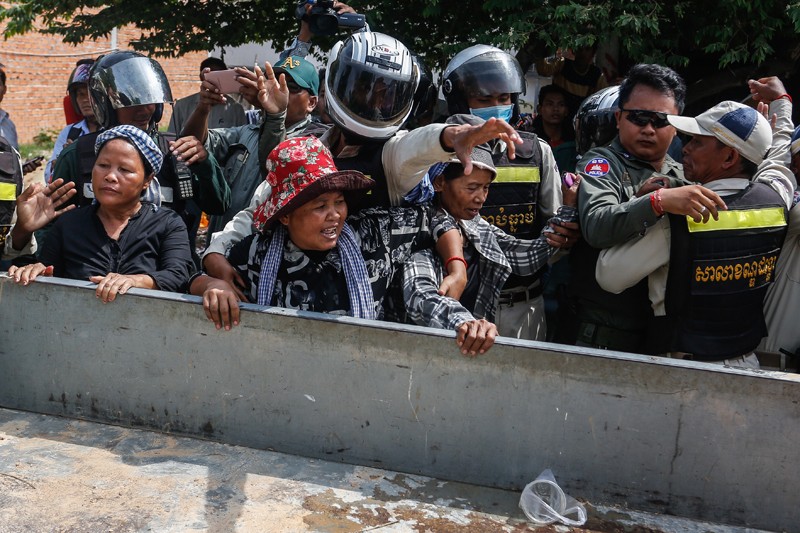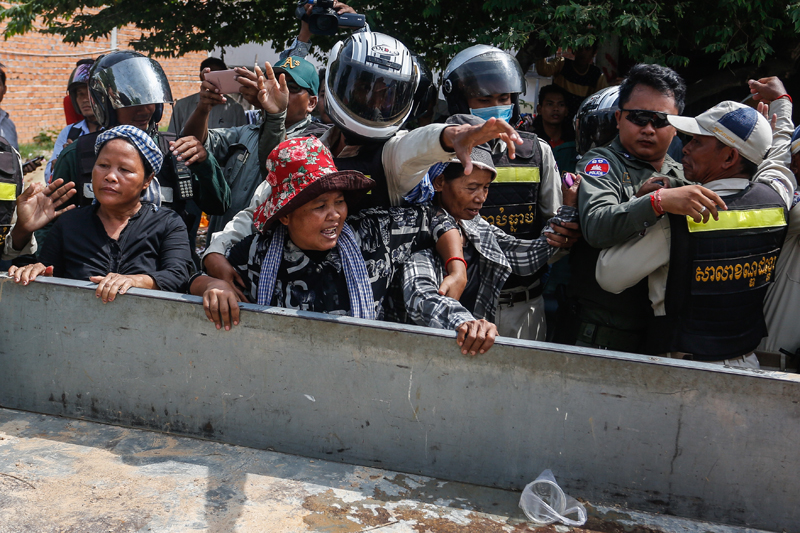Seven activists arrested in Phnom Penh on Monday morning for attempting to demonstrate against the recent arrests of four human rights workers and an election official were released by nightfall, a familiar conclusion to the latest “Black Monday” demonstration.
Protesters dressed in black shirts first gathered outside the city’s Prey Sar prison on May 9 to demand the release of the five prisoners, who have all been charged with bribing the alleged mistress of CNRP Vice President Kem Sokha to deny the affair. The Anti-Corruption Unit has been investigating the purported relationship for evidence of financial wrongdoing, although many see the effort as politically motivated.

On Monday morning, four activists were arrested on the way to the prison in a tuk-tuk and forced into a police truck that took them to the Dangkao district police station. Minutes later, three other activists were arrested outside the prison after affixing a bouquet of lotus flowers to a barbed-wire fence.
“Injustice. This is a great injustice. I have done nothing wrong,” said Im Srey Touch, one of the activists arrested outside the prison, while being forced into the bed of a waiting police truck.
The Law on Peaceful Assembly does not require organizers to seek or receive permission to hold a protest, only to give notice. But City Hall spokesman Met Measpheakdey said the seven were arrested because they had failed to secure advance permission.
“They had no permission,” he said. “They do not listen to our education about the Black Monday demonstrations for the release of the five accused people in prison,” he added. “This case is in the court’s hands and if they want to demand something they should follow the court procedure.”
Government officials have called the peaceful campaign for the release of the five prisoners “an urban rebellion” and said their choice of black—to symbolize the bleak state of human rights in the country—was an intolerable reminder of the Khmer Rouge.
On Monday, National Police spokesman Saran Komsath accused them of incitement.
“This is not expression but incitement to attract other people to join them in their goal to cause social turmoil,” he said.
True to form, however, the government had released all seven activists by the end of the day. Contacted in the evening, Mr. Measpheakdey said the women were released at 6 p.m. after signing contracts promising to stop their protests.
The spokesman said they were released even though the people they had arrested during prior Black Monday demonstrations—including four of the women taken into custody on Monday—had signed the same contracts.
“We are still educating them. We are patient, but if they still act like this we will take administrative measures,” he said, declining to elaborate.
Following her release, Chray Nim said she and the other women were questioned during their detention.
“They asked us why we wear black. We said we dress in black to mourn for human rights and show that human rights in Cambodia is now in the dark,” she said.
“We asked the police why we cannot wear black on Black Monday. They said we were breaking the law because the Interior Ministry had banned it.”
Ms. Nim said they signed the contracts but did not feel bound by them because the documents restricted only illegal protests.
“Our protests are legal because no law says we cannot wear black,” she said, pledging to keep demonstrating until the five prisoners were released.
Chak Sopheap, director of the Cambodian Center for Human Rights, said the police had no legal grounds to arrest the women.
“What the authorities did seemed to violate the freedoms of the people guaranteed by the Constitution and international law,” she said. “I think that if this [the arrests] continues, it will make the human rights situation worse.”
(Additional reporting by Khy Sovuthy)
Correction: A previous version of this article incorrectly stated that Im Srey Touch was arrested in a tuk-tuk on the way to Prey Sar prison. She was arrested outside the prison.




